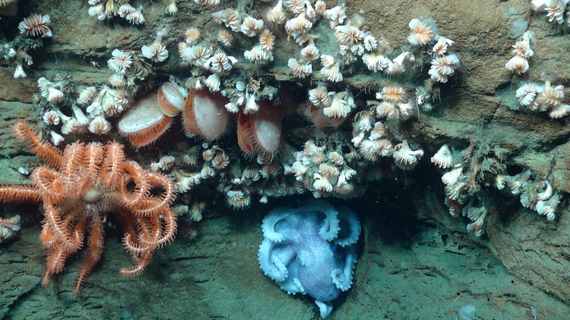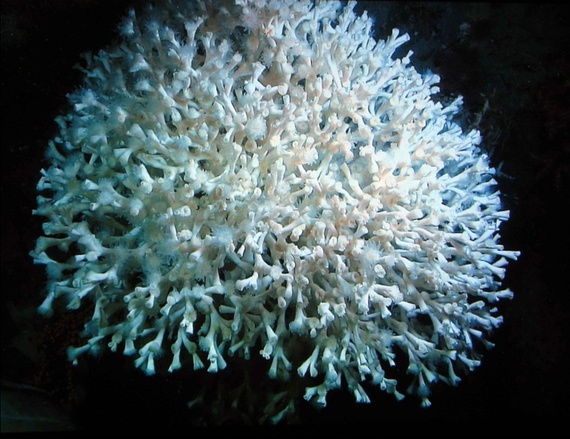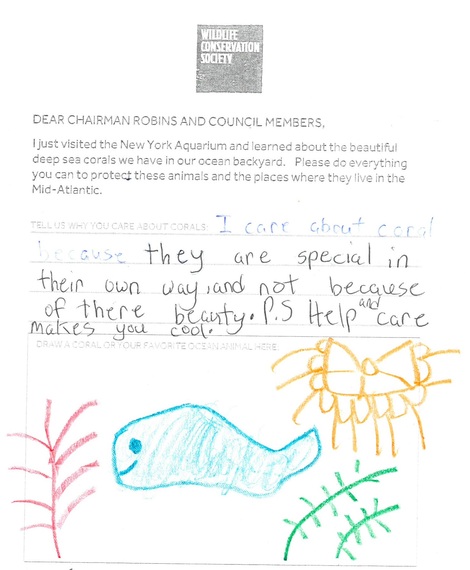We take our oceans for granted. Perhaps it is because we cannot see the many wonders they hold under the surface as easily as we see the wonders of the forests or the wetlands or the savannas. But the oceans are wonderful, and we need them.
Today, the United Nations has declared World Oceans Day, a day to remind everyone of the importance our oceans hold in sustaining human and animal life. The oceans act as food provider, climate regulator, oxygen source, transportation network, and recreation base for all the world's people and serve as home for much of the world's wildlife. We need to start treating oceans like the precious and limited resource that they have always been.
An octopus is pictured next to a deep-sea coral. (Image courtesy of Deepwater Canyons 2013: Pathways to the Abyss, NOAA-OER/BOEM/USGS)
WCS (the Wildlife Conservation Society), through its New York Aquarium and marine field research around the globe, has been helping the world discover and conserve our oceans for more than a century. WCS engages in ocean protection, sustainable fisheries, and marine species conservation across the waters of 23 countries and all five oceans.
But even here at home, people may not appreciate all that oceans do. Twenty million people reside in and around New York City, a metropolis surrounded by water on all sides. But how many know that the waters surrounding their city serve as a feeding ground, nursery, and migratory corridor for hundreds of species of aquatic wildlife, including whales, sharks and sea turtles, some of which are threatened or endangered?
One of the most fragile local marine areas that WCS's New York Seascape program covers is the Hudson Canyon, the East Coast's largest submarine canyon. Located just 100 miles southeast of New York City, it is home to deep-sea corals that provide food and shelter for many other species. Scientists are still only beginning to understand the complexity and richness of the ecology of offshore underwater canyons.
Lophelia pertusa, a cold-water coral, can be found in the deep waters of the North Atlantic Ocean. (Image courtesy of Deepwater Canyons 2013: Pathways to the Abyss, NOAA-OER/BOEM/USGS
But the Hudson Canyon, like many other submarine canyons, is facing serious threats from human activity, including the use of bottom-fishing gear that damages coral communities. These slow-growing ecosystems take hundreds or even thousands of years to form but can be wiped out by one pass of trawling gear. The damage is irreversible.
Recently, as part of a broad coalition, WCS supporters submitted 13,000 letters, petitions, and drawings asking the Mid-Atlantic Fishery Management Council to protect coral communities in the region, including those found in the Hudson Canyon. Next week, the Council will meet to decide the fate of deep-sea coral ecosystems from New York to North Carolina. We urge the Council to protect all 15 submarine canyons, including Hudson Canyon, as well as places deeper than 300 meters, from fishing gear that scrapes the bottom.
The drawing pictured here is one of thousands created by schoolchildren asking the Mid-Atlantic Fishery Management Council to protect coral communities in the New York region.
There is much we can do personally to conserve our oceans, starting with preventing plastic pollution by banning the use of tiny microbeads in personal care products, as I wrote about on Earth Day. We can also make smarter choices about what seafood we eat and urge better standards for the traceability of marine catch.
The oceans sustain us, and they are in trouble. On World Oceans Day, we need to appreciate all that the oceans provide and make sure we do all we can to protect them.



